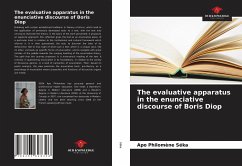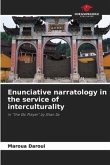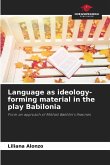Breaking with certain established traditions in literary criticism, which lead to the application of previously developed tools to a text, with the text only serving to illustrate the theory, is the basis of the work presented. It proposes an opposite approach: this reflection gives the text as an enunciative place, of a particular kind, in relation to the institutional and cultural framework which informs it. It is then questioned, the text, to discover the laws of its dehiscence. Not to lose sight of what such a text, which is a unique case, like no other, conceals as specific forms of enunciation, and to navigate with great strokes of the paddle towards the surging levelling of the enunciative theory. The path that this journey proposes is a transversal reading of the text. It consists in questioning enunciation in its foundations, in relation to the variety of discourse genres, in a kind of semantics of enunciation. Then, based on poetic analysis, the view examines the enunciative tools, pre-literary, as a physiology of enunciation where properties and functions of discursive organs are mixed.
Bitte wählen Sie Ihr Anliegen aus.
Rechnungen
Retourenschein anfordern
Bestellstatus
Storno








